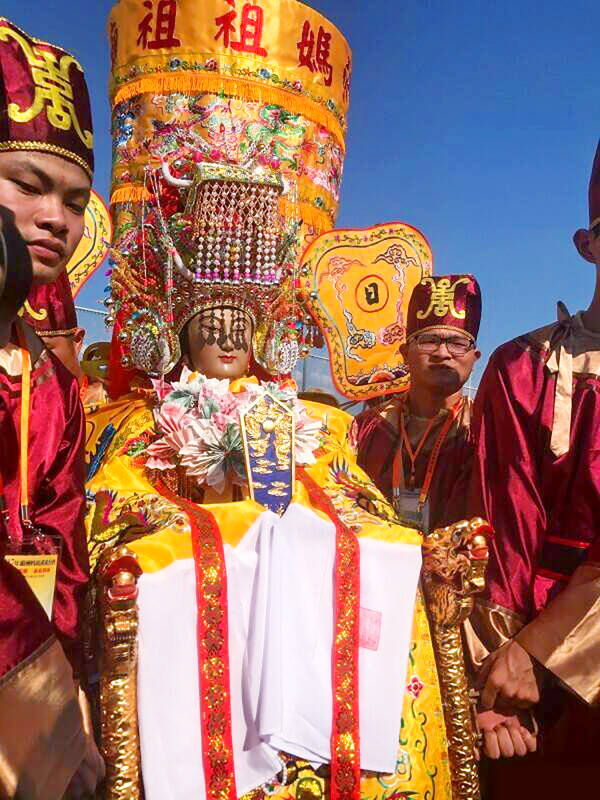China is attempting to subsume Taiwanese culture under Chinese culture by promulgating legislation on preserving documents on ties between the Minnan region and Taiwan, a Taiwanese academic said yesterday.
China on Tuesday enforced the Fujian Province Minnan and Taiwan Document Protection Act to counter Taiwanese cultural independence with historical evidence that would root out misleading claims, Chinese-language media outlet Straits Today reported yesterday.
The act is “China’s first ad hoc local regulations in the cultural field that involve Taiwan and is a concrete step toward implementing the integrated development demonstration zone,” Fujian Provincial Archives deputy director Ma Jun-fan (馬俊凡) said.

Photo: Taipei Times
The documents “reflect cross-strait historical ties and exchanges, and carries the memory of Chinese, attesting to the fact that people on both sides of the Taiwan Strait originate from the same root… and belong to one China,” she said.
The act says that the document preservation units “may collect documents on Minnan-Taiwan relations through donations, purchases, replication and other approaches,” while non-state museums would be encouraged to “take part in the preservation and use of Minnan-Taiwan relations documents via collection, compilation and exhibition.”
“People from Hong Kong, Macau and Taiwan, as well as overseas Chinese people, are encouraged to actively promote the documents on Minnan-Taiwan relations and take part in the preservation and use of the documents,” it says.
In Taipei, Hung Chin-fu (洪敬富), a professor of political science at National Cheng Kung University, yesterday said these are attempts to tie Taiwan to the Minnan region ethnically and culturally through efforts such as the demonstration zone for cross-strait integrated development set up in China’s Xiamen City.
The act is an escalation of cultural warfare against Taiwan to the legislative level and constitutes “lawfare,” a type of influence operations, he said.
Beijing attempts to prevent Taiwan from culturally separating itself from China by using laws to strengthen ties between Minnan and Taiwan in terms of cultures, customs, traditions and festivals, Hung said.
While threatening to take Taiwan by force using “guns,” Beijing also uses “pens” to claim that Taiwanese culture is “part of Chinese culture” and Taiwan and China “share the same ancestry and bloodline,” he said.
By emphasizing the Chinese origins of Taiwanese religions and cultures, such as the sea goddess Matsu (媽祖) and god of war Guan Gong (關公), Beijing attempts to form and fuel public opinion that could influence the political views of people in Taiwan, Hung said.
“This is ‘united front’ tactics without gunfire,” with the goal of undermining Taiwanese subjectivity and subsuming its cultural sovereignty under China, he said.

Three batches of banana sauce imported from the Philippines were intercepted at the border after they were found to contain the banned industrial dye Orange G, the Food and Drug Administration (FDA) said yesterday. From today through Sept. 2 next year, all seasoning sauces from the Philippines are to be subject to the FDA’s strictest border inspection, meaning 100 percent testing for illegal dyes before entry is allowed, it said in a statement. Orange G is an industrial coloring agent that is not permitted for food use in Taiwan or internationally, said Cheng Wei-chih (鄭維智), head of the FDA’s Northern Center for

The Chinese military has built landing bridge ships designed to expand its amphibious options for a potential assault on Taiwan, but their combat effectiveness is limited due to their high vulnerability, a defense expert said in an analysis published on Monday. Shen Ming-shih (沈明室), a research fellow at the Institute for National Defense and Security Research, said that the deployment of such vessels as part of the Chinese People’s Liberation Army (PLA) Navy’s East Sea Fleet signals a strong focus on Taiwan. However, the ships are highly vulnerable to precision strikes, which means they could be destroyed before they achieve their intended

About 4.2 million tourist arrivals were recorded in the first half of this year, a 10 percent increase from the same period last year, the Tourism Administration said yesterday. The growth continues to be consistent, with the fourth quarter of this year expected to be the peak in Taiwan, the agency said, adding that it plans to promote Taiwan overseas via partnerships and major events. From January to June, 9.14 million international departures were recorded from Taiwan, an 11 percent increase from the same period last year, with 3.3 million headed for Japan, 1.52 million for China and 832,962 to South Korea,

REWRITING HISTORY: China has been advocating a ‘correct’ interpretation of the victory over Japan that brings the CCP’s contributions to the forefront, an expert said An elderly Chinese war veteran’s shin still bears the mark of a bullet wound he sustained when fighting the Japanese as a teenager, a year before the end of World War II. Eighty years on, Li Jinshui’s scar remains as testimony to the bravery of Chinese troops in a conflict that killed millions of their people. However, the story behind China’s overthrow of the brutal Japanese occupation is deeply contested. Historians broadly agree that credit for victory lies primarily with the Chinese Nationalist Party (KMT)-led Republic of China (ROC) Army. Its leader, Chiang Kai-shek (蔣介石), fled to Taiwan in 1949 after losing a